Let’s Talk About
Mental Health & Wellbeing
The World Health Organisation (WHO) has a phrase ‘There is no health without mental health’. This recognises the crucial role our mental health contributes to our wellbeing. Our mental health and sexual health are connected. As we need to mind our sexual health, we also need to mind our mental health.
We can all experience good mental health. This is regardless of circumstances, age or gender, sexual orientation or whether we have a diagnosis of mental illness or not.
These pages have been created for gay & bisexual men, men who have sex with men (gbMSM) and trans people. However, much of the information is relevant across the LGBTQI+ rainbow.
Being LGBTQI+
The lives of Irish LGBTQI+ people have improved in recent times. We have access to greater levels of justice and equality. There is still some way to go for full equality but by and large we are a happy and well-adjusted community. However, many of us do struggle with our mental health from time to time.
Historically, LGBTQI+ people in Ireland have lived through oppression and faced homophobia. This manifested itself into stress and anxiety, and some mental health issues. Despite improvements in our laws and social attitudes, some forms of oppression can still be experienced.
While LGBTQI+ people are not inherently any more prone to mental health problems than other groups in society, coping with the effects of minority stress can be detrimental to LGBTQI+ people’s mental health. Minority stress refers to the additional stress that members of marginalised groups experience because of the prejudice and discrimination they face. Some LGBTQI+ people (like members of any minority group) are at greater risk of stress, due to their group’s increased stigmatised and marginalised status in society and within the LGBTQI+ community.
Mental Health – what to watch out for

The stress sometimes associated with being LGBTQI+, as well as everyday stress, can make us feel alone, angry, tired or withdrawn. These feelings are normal and usually pass. But, if they become overwhelming or don’t go away, they could be signs of low mental health.
Signs we may have a mental health problem:
- Feelings of sadness or hopelessness
- Excessive and undue worry
- Significant mood changes
- Low self-esteem
- Changes in appetite or eating habits
- Changes in sleeping patterns
- Feeling tired all the time
- Withdrawal from friends and family
- Not caring about other things that are usually important
- Problems functioning, paying attention or staying focused
- Destructive behaviour offline and online
- Overuse of substances like alcohol or drugs
- Thinking about suicide
These signs can appear in our lives in different ways. It could mean we are having trouble sleeping at night or that we forget or not bother to eat. We could be ignoring our friends and family or have lost interest in hobbies we once loved. It may be we find ourselves unmotivated and unwilling to leave the bed or couch and struggling with everyday life.
When we are experiencing some of these things, it can help to reach out. Support can range from informal support from friends or family to advice from an LGBTQI+ organisation or our GP. Check out the help and supports section of this page. We do not have to struggle. Life can be different.
Mental Health Vulnerabilities
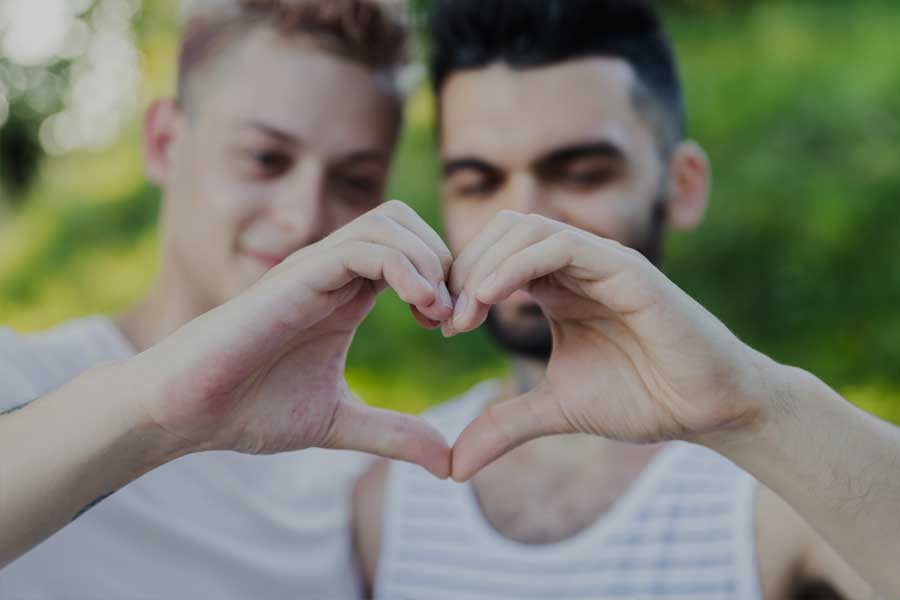
The majority of LGBTQI+ people have and maintain high mental health. Yet, research shows that being part of a minority means you are at greater risk for low mental health. This is known as minority stress and is true for any minority groups. Being aware of vulnerabilities can help us understand our feelings better. It also allows us to take steps to help ourselves through. We have a list of supports at the bottom of the page. By contacting any of them, we can begin the process of helping ourselves. The following are some vulnerabilities that can affect LGBTQI+ people.
Sharing our True Self with Others
Some of us still feel the need to protect ourselves from harm, and we choose to not to share our sexual orientation or gender identity with others. Not being able to be our true selves can add to the stress of everyday life. This in turn can affect both our mental and physical health.
Lack of support from family or friends
Some LGBTQI+ people can experience a lack of support from family and friends. This may happen when we first come out (share your true self with them), when we get into a relationship, or start a family.This can be hurtful and harmful to our mental health. Sometimes families, in particular parents, don’t know how to support LGBTQI+ family members. Some may need some support themselves. Information and supports are available for LGBTQI+ people and their parents.
Negative Feelings about ourselves
Years of exposure to myths, stereotypes and societal attitude has forced many LGBTQI+ people to internalise this negativity. Some of us may believe that these myths, stereotypes, and homophobic rhetoric are true. Internalised homophobia, transphobia or biphobia can worsen general stress. This in turn can lead to lower physical and mental health.
Our Body Image/Femininity/Masculinity
GBQI+ culture, or the ‘scene’, can be disproportionally focused on looks, masculinity and status. Many of us might not fit neatly into various labels or norms. Everyone is different and unique, there is no ‘normal’. However, some of us may suffer ‘stigma’ from some of our peers and society at large simply for being our true selves. Some may feel there is a pressure to be masculine, leading many GBQI+ men to feel frustrated and stressed. We are all beautiful beings with unique qualities that make us special and lovable. Recognising this in ourself is a good step to finding positive self-regard.
Our Race
Combatting racism in all its forms is important for our whole society. A person of colour or from an ethnic minority may face additional challenges. As a person of colour or coming from an ethnic minority we may feel marginalised, stereotyped, excluded or fetishised. This can in turn affect our mental health and wellbeing. If you have experienced racism, check out this Responding to Racism Guide from the Irish Network Against Racism.
Our HIV Status
The outlook for people living with HIV has improved over the years. It is now a medically manageable condition. When we are on effective treatment our HIV becomes “Undetectable” and it cannot transmit itself to others. Yet, high levels of stigma remain, and this can have a negative effect on mental health. We are working to end this stigma in Ireland and we are here to support you.
Isolation
Most of us experience loneliness at some point in our lives. It might be because we spend more time by ourselves than we want, or because we are disconnecting from the people around us. Often when we are struggling with isolation, we retreat more. This is likely to make the loneliness and isolation worse. If isolation is a concern, check out the help and supports at the bottom of the page. There is help out there.
Harassment and Bullying
Anyone can be bullied. But LGBTQI+ people can also experience homophobic or transphobic bullying. This is targeted bullying because of sexual orientation or gender expression and is legally harassment. It can happen anywhere, such as the classroom, online, the workplace, sporting field, or in the home.
Being bullied may lead you to feel upset, threatened, humiliated or vulnerable. Bullying and harassment can cause physical, mental and social pain. This can make us feel alone, scared, angry, confused or sad. All these can affect our mental health. Bullying is unacceptable. Professional help and advice is available. See the help and supports at bottom of page.
Sex
Our mental health and sexual health are connected. Sexuality is a vital part of our lives and enjoying sex is recognised as an important part of maintaining mental and physical health. We all have very different types of relationships with sex, both in person and virtually. Our relationship with sex can also differ at certain points in our life. If we enjoy who we are and how we express our sexuality, it can increase our mental health. If we become concerned about how we feel and think about sex, it can lower our mental health. If this happens, there is a peer sexual health outreach worker at MPOWER who is there to listen and help. MPOWER is a relaxed and friendly service for gay and bisexual men, men who have sex with men and trans people. At MPOWER we can get support and resources relating to HIV, STIs and sexual health & wellbeing.
Drugs & Alcohol
Studies in Ireland, and internationally, have shown higher levels of alcohol misuse among the LGBTQI+ community. Drinking or taking drugs can be done for many reasons. Sometimes it can lower our physical and mental health and make everyday life a bit more of a struggle. Knowing how alcohol and drugs affect us, and learning more about these substances can help keep us safe. When we find we are taking more than we would like, or when and how we use drugs and alcohol is becoming a problem in our lives, we need to think about getting help. We should not be afraid to reach out. There is no judgement from support services, they are there to help us. Check out our guidelines around drugs and alcohol keep safe.
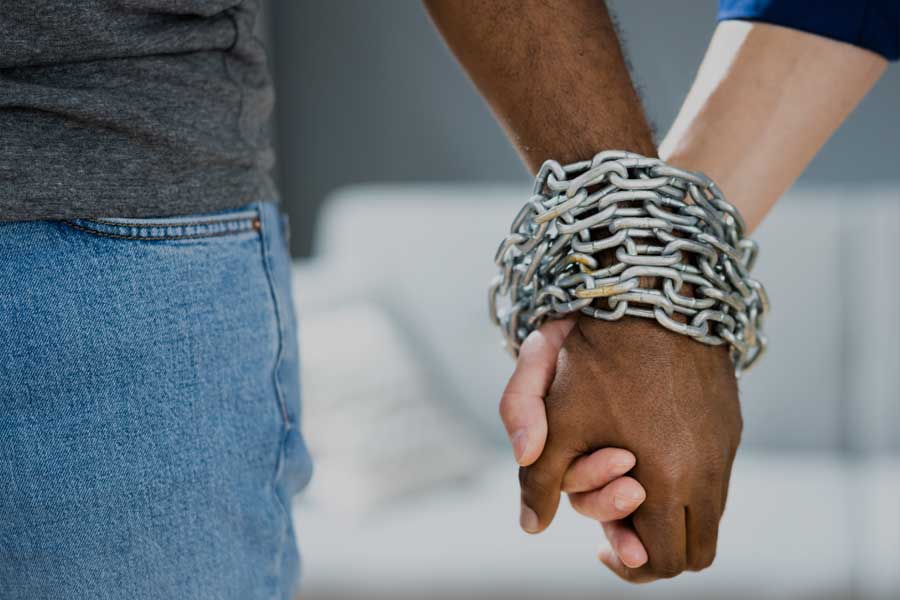
Our Relationships
Sometimes relationships can be a source of pressure. This can put a strain on our mental health. When we begin a relationship with a new partner, we need to remember to keep working on our existing friendships and family relationships as well.
Relationship break-ups can have a powerful impact on our mental health. It can bring a sense of empowerment and relief or uncertainty for the future, anger, sadness, a sense of failure, loneliness and isolation. Talking to someone we can trust at this time can help us to process these emotions. We could speak to a family member, friend, or find a professional for support and advice. Supports at bottom of page.
Keys to Maintaining Good Mental Health
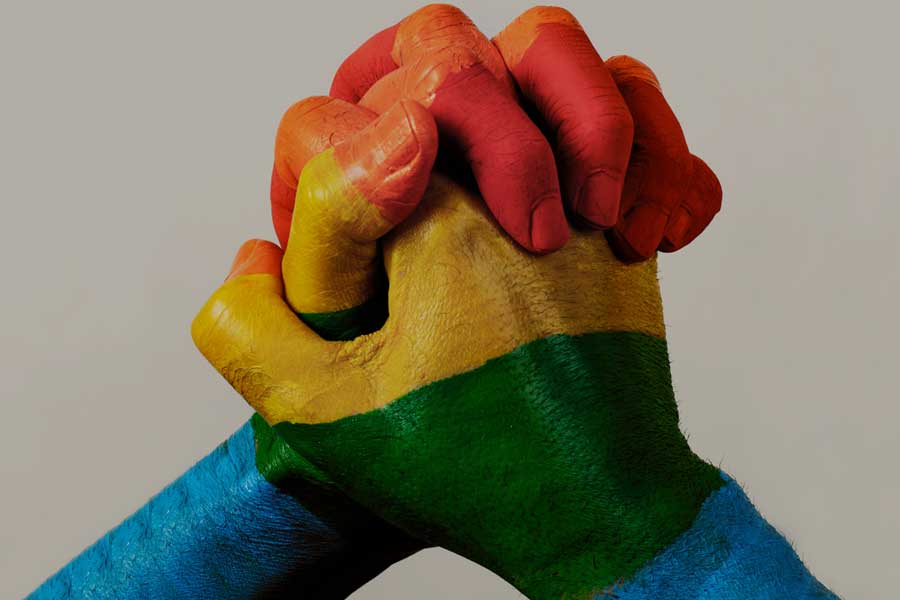
We all need to look after our mental health, and, just like physical health, it needs to be maintained. The following are some ways you can look after your mental health:
Keep active
Regular exercise can really give our mental health a boost. For example, a walk every day can make a big difference. See more at www.healthyireland.ie
Accept ourselves and others
Everyone is different and is entitled to respect. Many things make us who we are. Diversity is beautiful.
Eat and sleep well
Having a balanced diet and a good sleep pattern will not only help the way we feel, but it will also help the way we think. Good food and regular sleep are essential for our mind and body to work properly. See more at www.healthyireland.ie.
Drink less alcohol
Alcohol is a depressant and overdoing it can increase anxiety and lead to depression. Avoiding alcohol when we are feeling down or worried is important. Drinking alcohol will not help us deal with problems in the long term. See more at www.askaboutalcohol.ie
Having fun
Setting aside some time to do something we enjoy, especially if we are not feeling great, will help us feel better. For example, doing creative activities or masturbating, can help when we are anxious or low.
Stay in touch
Trusted friends and family are important, especially at difficult times. We do not have to face things on our own. It can be good to keep in contact or reconnect with someone close. If you are not comfortable talking to someone you know, it might be worth reaching out to a friendly professional from the support services listed below.
Talk about it
Talking about feelings is a one way to deal with a problem. It can help us feel less isolated or overwhelmed. Problems can feel manageable when they are shared with others.
Ask for help
Asking for help is a sign of personal strength. It is a skill that can be learnt. Everyone needs help from time to time and is plenty of trustworthy people out there willing to help. See more at www.yourmentalhealth.ie and check out the help and support section at the bottom of the page.
8 WAYS TO FEEL CALMER

If we are feeling stressed or anxious, here are 8 things we can try to calm ourselves.
- Take Time Out
It’s impossible to think clearly when you’re filled with fear or anxiety. The first thing to do is take time out so you can physically calm down.Distract yourself from the worry for 15 minutes. Go for a walk, make a cup of tea, sing a song. Having a bath can also help calm your mind. - Breathe Through PanicIf you start to get a faster heartbeat or sweating palms, the best thing is not to fight it. Try Five Finger Breathing. This works by engaging multiple senses at the same time and crowding out those worrying thoughts.
- STEP A: Hold your hand in front of you, fingers spread.
- STEP B: Using your index finger on the opposite hand, start tracing the outline of your extended hand, starting at the wrist, moving up to your small finger.
- STEP C: As you trace up your small finger, breathe in. As you trace down your small finger, breathe out. Trace up your ring finger and breathe in. Trace down your ring finger and breathe out.
- STEP D: Continue finger by finger until you’ve traced your entire hand. Now reverse the process and trace from your thumb back to your small finger, making sure to inhale as you trace up, and exhale as you trace down.
- Focus on Our FeetWhen we feel our stress level rising, try this quick calming exercise.Take a moment to focus on your feet. You can do this standing or sitting, with your feet on the ground. How do they feel? Are they warm or cold? Are they tingly? Moist or dry? Wiggle your toes. Feel the soles of your feet. Feel your heels connecting with your shoes and the ground beneath you. Anxiety tends to be in your chest and throat. Our feet are as peripheral as you get from your anxiety zones.
- Move for three minutesIt just takes a short burst of exercise — three minutes to be exact — to improve our mood. Do jumping jacks. Stand and box. Do wall push-ups. Dance. Anytime we move our muscles and get our heart rate up, we get a boost in dopamine and sense ourselves as alive and engaged.
- Connect with natureSpend time outside. Watch birds. Wander amid the trees. Take a fresh look at the vistas and objects around you during a walk. Recent research shows that consciously taking in the wonders of nature amplifies the mental health benefits of walking.
- Don’t try to be perfectLife is full of stresses, yet many of us feel that our lives must be perfect. Bad days and setbacks will always happen, and it’s important to remember that life is messy.
- Get the basics rightLots of people turn to alcohol or drugs to self-treat anxiety, but this will only make matters worse. Simple things like a good night’s sleep, a wholesome meal and a walk are often the best cures for anxiety.
- Visualise a happy placeTake a moment to close your eyes and imagine a place of safety and calm. It could be a picture of you walking on a beautiful beach or a happy memory from childhood. Let the positive feelings soothe you until you feel more relaxed.
HELP AND SUPPORT
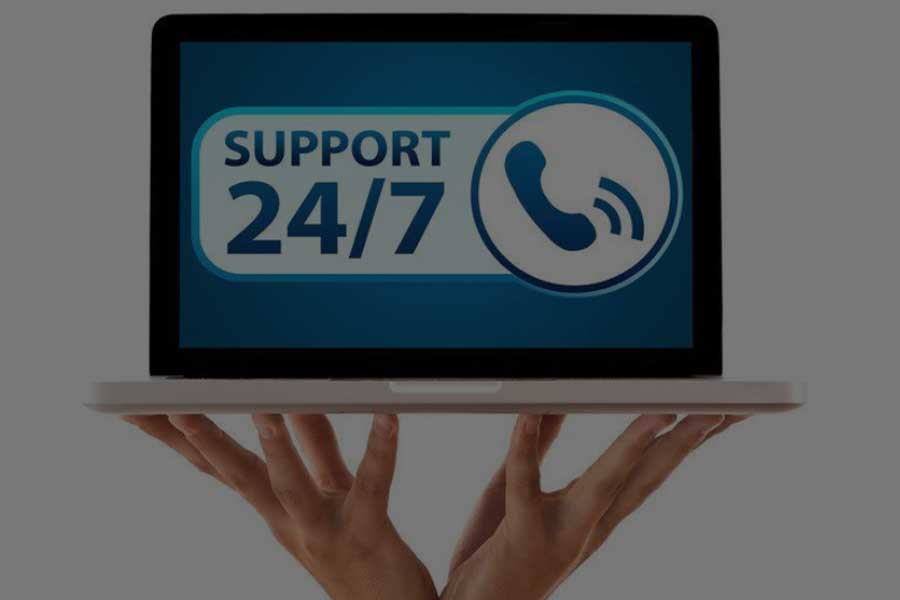
We’re all different, but the one thing we have in common is that nobody is perfect. Many things make us who we are. We are all beautiful beings with unique qualities that make us special and lovable. Recognizing this in ourselves is a good step to finding positive self-regard.
Self-harm and Suicide
Sometimes, more distressing problems can appear permanent. It can seem that things will never get better. When we self-harm we may be trying to escape from or deal with pain or stress.
Some people also have thoughts of suicide. When we have these thoughts, we need help and support to deal with whatever is causing us to feel this way. Most problems have a solution, but sometimes because we are feeling so low it can be difficult to believe.
We do not have to be alone. There are people who can help us to work through our problems, no matter how difficult they appear to be. If our mood is low and we find it is not lifting, or we begin to make plans for ending our life, then we need to consider professional help. It is important to share our feelings with someone we can trust. We could also consider accessing professional counselling. There are a number of supports and support organisations that are here to help us.
If you are being supported by a mental health team, or have been in the past, contact the service for support in a crisis.
LGBTQI+ SUPPORTS
We’re all different, but the one thing we have in common is that nobody is perfect. Many things make us who we are. We are all beautiful beings with unique qualities that make us special and lovable. Recognizing this in ourselves is a good step to finding positive self-regard.
Self-harm and Suicide
Sometimes, more distressing problems can appear permanent. It can seem that things will never get better. When we self-harm we may be trying to escape from or deal with pain or stress.
Some people also have thoughts of suicide. When we have these thoughts, we need help and support to deal with whatever is causing us to feel this way. Most problems have a solution, but sometimes because we are feeling so low it can be difficult to believe.
We do not have to be alone. There are people who can help us to work through our problems, no matter how difficult they appear to be. If our mood is low and we find it is not lifting, or we begin to make plans for ending our life, then we need to consider professional help. It is important to share our feelings with someone we can trust. We could also consider accessing professional counselling. There are a number of supports and support organisations that are here to help us.
If you are being supported by a mental health team, or have been in the past, contact the service for support in a crisis.
LGBTQI+ SUPPORTS

The National LGBT Helpline provides a confidential, listening, support and information service to lesbian, gay, bisexual and transgender (LGBT) people. The service is also used by people who are questioning if they might be LGBT, as well as the family and friends of LGBT people and professionals looking for information.
The LGBT Helpline is available 7 days a week: Phone 1890 929 539
Mon – Thur (6.30pm to 10pm)
Friday’s (4pm to 10pm)
Sat-Sun (4pm to 6pm)
The Transgender Family Support Line is open twice a week: Sunday (6pm-9pm)
Tuesday (10am-12pm). Phone 01 907 3707
Visit www.lgbt.ie
BeLonG To/Pieta House Counselling Service: This is free support for LGBTQI+ young people in the Dublin area who are self-harming or thinking of suicide. Call 01 462 4792 or email belongto@pieta.ie to book an appointment. Visit https://www.belongto.org/counselling-service-pieta-house/ for more information.
The Switchboard Ireland

Outhouse, 105 Capel St, Dublin 1.
LGBTQIA support & resources since 1974 | 7 days per week. The Switchboard Ireland is Ireland’s longest running support service for the LGBT+ community. LGBT+ volunteers are available 7 days a week on phone, email and online chat to offer confidential listening, support and information. Monday to Friday: 6:30pm – 9pm, Saturday & Sunday: 2pm – 5pm.
Phone 01 872 1055
Email: ask@theswitchboard.ie for support & signpost by email
contact@theswitchboard.ie for other questions
Website: theswitchboard.ie
Facebook: https://www.facebook.com/theswitchboard.ie
Monday: Men, Gay, Bi, MSM Sexual Health
Tuesday: Lesbian, Bi, Married Sexual health Resources
Wednesday: M/F Non-binary, Kink, Fetish, Questions about Sex/Porn Addiction
Thursday: Substance Abuse, Chems, Narcotics, Alcohol
Friday: Trans/Intersex Non-Binary, Support and Resources
Saturday: COVID Helpline, Isolation, Homelessness, Support and Resources
Sunday: Crossdressers Support Line, Trans Spectrum, Non Binary, CD/TV
Transgender Equality Network Ireland (TENI) seeks to improve conditions and advance the rights and equality of trans people and their families. Their vision is an Ireland where trans people are understood, accepted and respected, and can participate fully in all aspects of Irish society.
Visit Website: www.teni.ie Phone: 01 873 35 75
MPOWER
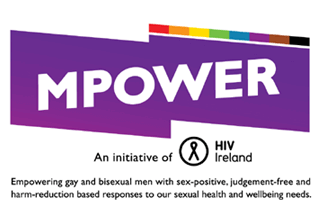
The MPOWER team of peer sexual health outreach workers offer information, support and resources relating to HIV, STIs and other sexual health & wellbeing needs. The team is available to speak to you by phone, email, WhatsApp, and Zoom.
- Phone 01-8733799 and ask for the MPOWER Team (Mon-Fri 10am – 5pm)
- Whatsapp on 086 065 7212 (Davy), 0866002996 (Mark), 0892291869 (Diego)
- Email: mpower@hivireland.ie
- Website: https://mpower.hivireland.ie
GOSHH Mid-West

GOSHH (Gender Orientation Sexual Health HIV) covers the Mid-west of Ireland and offers personal support, training and education; peer social or support groups, and counselling. GOSHH aim to provide a safe, welcoming environment for the people we work with by fostering a person-centred approach to support, information and advocacy.
GOSHH’s client base include People who are LGBTI+ or have diverse Genders and Orientations, their caregivers and families; People seeking support around their Sexual Health and wellbeing; People Living with HIV, Hepatitis C and other blood borne viruses and Sex Workers. GOSHH also provides a support service to professionals who would benefit from interagency work, training, advice or support, when working with our client base.
GOSHH work with people of all ages including those under the age of 18. Their service is confidential and for the most part free of charge.
To contact GOSHH please call us on 061 314354 or email info@goshh.ie
Sexual Health Centre Cork
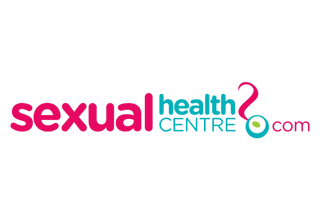
Sexual Health Centre Cork offer the services of a dedicated Sexual Health Advisor to members of LGBTQIA+ community. Aaron O’Sullivan provides sexual health advice and support in an understanding and warm environment, on a wide range of matters such as healthy relationships, sexuality, sexual dysfunction, gender and sexual identity.
You can make an appointment by sending an email to info@sexualhealthcentre.com, calling the Sexual Health Centre on 021 427 5837 or contacting Aaron directly at aaron@sexualhealthcentre.com
GENERAL MENTAL HEALTH SUPPORTS
YourMentalHealth.ie Visit www.yourmentalhealth.ie for information on how to mind your mental health, support others, or to find a support service in your area. You can also call the Your Mental Health Information Line on Freephone 1800 111 888, anytime day or night, for information on mental health services in your area.
Jigsaw offer a free service providing support and advice to young people (aged 12-25) experiencing mental health difficulties.
Visit www.jigsaw.ie/help
Aware provide free support, education and information services for people who experience depression or bipolar disorder, as well as loved ones. Visit website: www.aware.ie Freephone 1800 80 48 48. Available Monday – Sunday 10am to 10pm.
URGENT HELP
A GP
A GP can offer support for anyone in crisis. If possible, ask someone to come along with you. Find a service near you:
GP or health centre
Out of hours GP service
Visit www.pieta.ie, phone 1800 247 247 or text HELP to 51444
Samaritans offer a safe place for you to talk any time you like, in your own way – about whatever’s getting to you. They won’t judge you or tell you what to do – they will listen to you.
Visit www.samaritans.ie, freephone 116 123 or email jo@samaritans.ie
50808.ie 24/7 Anonymous Text Support from the HSE
If you need support about any type of crisis, you can chat in confidence, 24/7 with a trained crisis volunteer over text. Connect with a trained volunteer who will listen to you and help you move towards feeling better. Here’s how the support service works:
- Text LGBTQI+ to 50808 anytime when you need support. Standard SMS rates may apply.
- A trained volunteer will listen to you and help you think more clearly, enabling you to know that you can take the next step to feel better.
- Visit text50808.ie for more information
FURTHER READING

Check out this HSE resource on Building Your Self Confidence
YourMentalHealth.ie:
- Mental health issues if you’re lesbian, gay, bisexual, transgender or intersex
- LGBTQI+ sexual identity and orientation
Looking After Your Mental Health for LGBTQI+ People (HSE NOSP)
Racism and Mental Health from Jigsaw.ie
Books:
Ties that bind. Familial homophobia and its consequences
Book by Sarah Schulman
The Velvet Rage: Overcoming the Pain of Growing Up Gay in a Straight Man’s World
Book by Alan Downs
Straight Jacket – How to be Gay and Happy
Book by Matthew Todd
What have we missed? Let us know at padraig@ghn.ie



